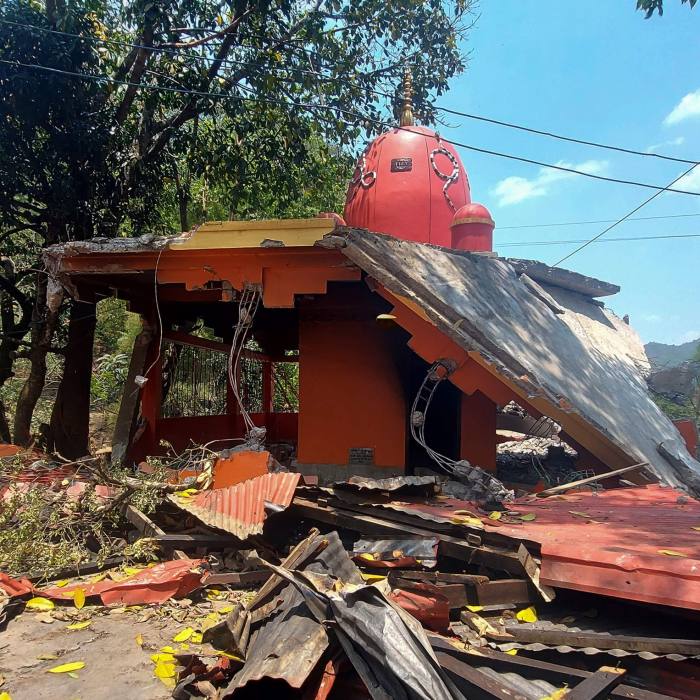Indian authorities are struggling to quell an ethnic conflict in the north-eastern state of Manipur that has killed more than 100 people and displaced more than 50,000, according to activists, as analysts warned that the unrest could destabilise the already volatile border region.
Violence broke out last month between the ethnic Meitei people who inhabit the valley around the capital Imphal and make up more than half of Manipur’s population of about 3mn, and Kukis and Nagas, hill-dwelling tribal communities, over fears of demographic displacement and the protection of minority privileges.
Manipur, which means “the land of gems” in Sanskrit, has long been riven with ethnic strife, and was drawn into a wider insurgency in the north-east for liberation that has raged since India’s independence.
But unlike past outbreaks that pitted insurrectionists against New Delhi, the current clashes have primarily involved civilians, who have looted thousands of weapons from police including assault rifles and ammunition, local media reported, citing unnamed official sources. Last week, two women and a child were burnt alive in an ambulance by a mob on Imphal’s outskirts, an atrocity that shocked Indians.
New Delhi at the weekend set up a committee to encourage peace talks between the communities, but the process has failed to get off the ground. A local police official in the state said on Wednesday that at least nine people were killed in a gun battle the previous day, Reuters reported. Security forces have been deployed in an effort to maintain order.
The violence has driven hundreds of Manipur residents to seek refuge over the border in Myanmar’s Chin state, which is itself racked with conflict between rebel groups and the forces of General Min Aung Hlaing’s military junta. Journalists have faced restrictions on reporting from Manipur, and an internet blackout has been in place for more than a month.
The conflict in Manipur has a sectarian backdrop: most Meiteis are Hindu, while Kukis are predominantly Christian. According to local religious and civil society groups, about 250 churches have been destroyed in the fighting.
The state government’s campaign to eradicate poppy cultivation in protected forests and the drugs trade in the hilly border region have also inflamed local grievances, as have tensions over immigration in the north-east from Bangladesh and Myanmar — an emotive issue that Prime Minister Narendra Modi has amplified on the national stage.
But analysts and local residents said the conflict was primarily concerned with land privileges and other rights reserved for tribal groups, which date back to the British colonial era.
The latest clashes broke out on May 3, after Kukis and Nagas organised a rally to protest against a court order to accelerate plans to extend “scheduled tribe” status to Meiteis. The designation would confer affirmative action advantages currently reserved for tribal groups and would allow Meiteis, who reside in low-lying land, the right to live in hill areas.




Khuraijam Athouba, a Meiti and social activist, said the conflict was a “fight to correct demographic imbalance in the hills caused by illegal immigrants from across the border”.
Kukis have accused the state government, controlled by Modi’s Hindu nationalist Bharatiya Janata party, of siding with the Meiteis, but have encouraged the central government to intervene to restore order.
“This is state-sponsored violence,” said George Guite, who runs a non-governmental organisation that advocates for Kukis’ rights, adding that peace could only be achieved if New Delhi sacked the local administration and took direct control of Manipur.
“The Meiteis control everything, including the police commandos,” he said.
Ahead of national elections next year, the opposition Indian National Congress has seized on the conflict to attack Modi, who has not visited the state or publicly addressed the unrest, since the current disorder began last month.
“It is now more than 40 days and the prime minister has not even muttered a word,” said Pradip Phanjoubam, an ethnic Meiti and editor of the Imphal Review of Arts and Politics.
“There was a train accident and he rushed there and made all kinds of optics, but nothing about Manipur,” he added, referring to a collision early this month that killed at least 275 people and injured hundreds more.
Amit Shah, India’s home affairs minister and a top Modi deputy, visited the state late last month and appealed for peace. India has deployed about 40,000 security forces in Manipur and is trying to impose buffer zones between the plains and mountains.
But Guite, the Kuki activist, downplayed the prospects for reconciliation. “We can’t just start living together like before, even if there is peace,” he said.
Credit: Source link















